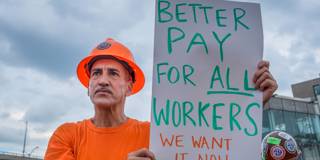
Essential Protections for Essential Workers
As we sprint to overcome the current public-health and economic crisis, we must also prepare for the marathon of fixing the systemic imbalances that have left workers vulnerable to infection and economic hardship. Only by building an economy that truly works for everyone can we prepare effectively for the inevitable next crisis.
NEW YORK – The COVID-19 crisis has exposed deep vulnerabilities in our economies and societies. Just as those with pre-existing health problems are more likely than their healthy counterparts to face serious complications and even death if they become infected, workers and small businesses are most at risk from the pandemic-induced economic downturn. This disparity is particularly pronounced in the United States.